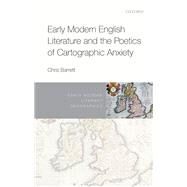Early Modern English Literature and the Poetics of Cartographic Anxiety
, by Barrett, Chris- ISBN: 9780198816874 | 0198816871
- Cover: Hardcover
- Copyright: 5/22/2018
The Cartographic Revolution in the Renaissance made maps newly precise, newly affordable, and newly ubiquitous. In sixteenth-century Britain, cartographic materials went from rarity to household decor within a single lifetime, and they delighted, inspired, and fascinated people across the socioeconomic spectrum. At the same time, they also unsettled, upset, disturbed, and sometimes angered their early modern readers. Early Modern English Literature and the Poetics of Cartographic Anxiety is the first monograph dedicated to recovering the shadow history of the many anxieties provoked by early modern maps and mapping in the sixteenth and seventeenth centuries.
A product of a military arms race, often deployed for security and surveillance purposes, and fundamentally distortive of their subjects, maps provoked suspicion, unease, and even hostility in early modern Britain (in ways not dissimilar from the anxieties provoked by global positioning-enabled digital mapping in the twenty-first century). At the same time, writers saw in the resistance to cartographic logics and strategies the opportunity to rethink the way literature represents space—and everything else. This volume explores three major poems of the period—Edmund Spenser's The Faerie Queene (1590, 1596), Michael Drayton's Poly-Olbion (1612, 1622), and John Milton's Paradise Lost (1667, 1674)—in terms of their vexed and vexing relationships with cartographic materials, and shows how the productive protest staged by these texts redefined concepts of allegory, description, personification, bibliographic materiality, narrative, temporality, analogy, and other elemental components of literary representations.
A product of a military arms race, often deployed for security and surveillance purposes, and fundamentally distortive of their subjects, maps provoked suspicion, unease, and even hostility in early modern Britain (in ways not dissimilar from the anxieties provoked by global positioning-enabled digital mapping in the twenty-first century). At the same time, writers saw in the resistance to cartographic logics and strategies the opportunity to rethink the way literature represents space—and everything else. This volume explores three major poems of the period—Edmund Spenser's The Faerie Queene (1590, 1596), Michael Drayton's Poly-Olbion (1612, 1622), and John Milton's Paradise Lost (1667, 1674)—in terms of their vexed and vexing relationships with cartographic materials, and shows how the productive protest staged by these texts redefined concepts of allegory, description, personification, bibliographic materiality, narrative, temporality, analogy, and other elemental components of literary representations.







